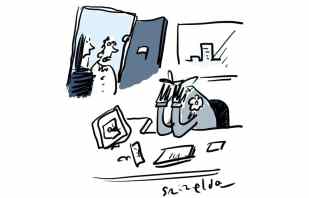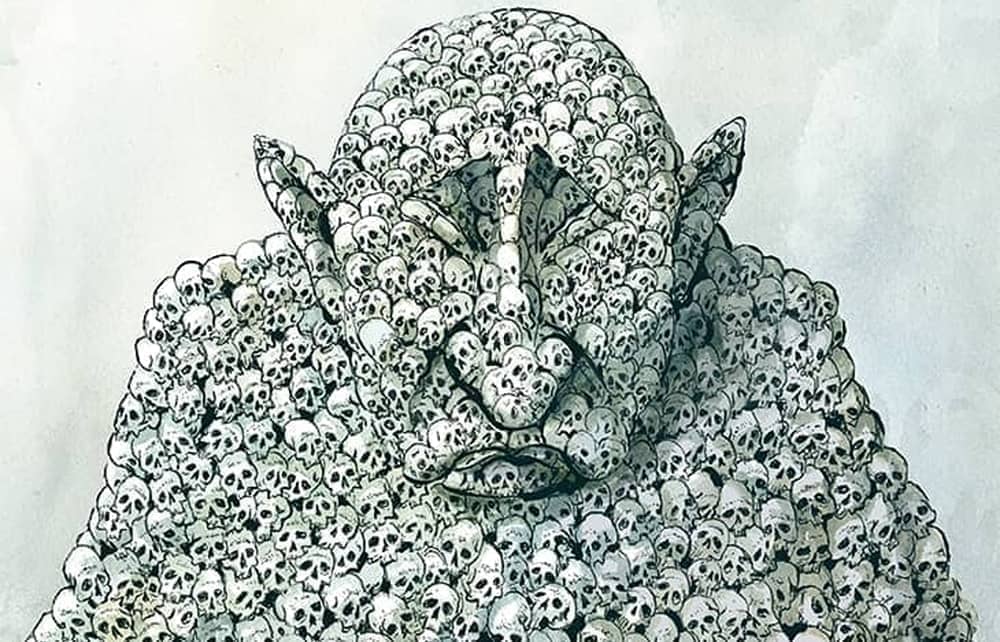Alexander Rodnyansky has a desk waiting for him back at Cambridge, where he’s currently on sabbatical from his role as a junior economics professor. But he won’t be returning for some time. He’s working from Kyiv, prioritising his other job: as economic adviser to Volodymyr Zelensky.
Rodnyansky was in Ukraine when the war broke out and he could easily have returned to the UK. ‘That wasn’t really much of a thought,’ he says. ‘I’m sixth-generation Kyiv. I was just going to stay.’ He became a full-time presidential adviser two years ago, hired to help reform Ukraine’s financial institutions, including the privatisation of state-owned commercial banks. ‘About 55 per cent of our banks are government-owned,’ he says. ‘That’s very unnatural for a market economy.’ Ukraine was hoping to modernise in a way post-Soviet Russia has failed to do.
Ukraine’s economy was expected to grow by around 3.5 per cent this year, he says. The government’s plan was to introduce ‘transformations in the judiciary’ to tackle the power of the oligarchs. ‘I would certainly say that Ukraine was on a stable path. And that’s one of the reasons why the Russian side didn’t want to tolerate this for much longer.’
Does he think Vladimir Putin’s invasion was, in part, motivated by a fear that Ukrainians were better off than Russians? ‘The economics [of the invasion] comes in a slightly more nuanced way,’ he explains. ‘For years, Russia’s economy has been in stagnation. For the past ten years, real incomes there have actually fallen. So [Putin] came to the conclusion that there wasn’t much he could do in terms of economic achievements. He had to resort to military means.’

Putin’s ‘special operation’ may have failed in its original strategy to take Kyiv, but as Russia’s tactics have hardened in the Donbas there has been an enormous toll on Ukraine’s industry. ‘A lot of those factories and the heavy machines that we used to have in the east have gone for good, I think.’
Is there much meaningful economic activity in wartime? Increasingly, yes – albeit quite far back from the front lines. ‘The good news is that we see large sectors of the economy adapting to the current environment,’ Rodnyansky says. ‘In the western parts, you basically have life more or less as usual – except for the occasional daily siren and air raids, of course.’ Restaurants are re-opening, he says, and train ticket sales are up. ‘And in May, for the first time, we also saw an influx of migrants back to Ukraine that exceeded the movements out of the country.’
Agriculture generated about 40 per cent of Ukraine’s pre-war export revenue. But Russia has blocked the main ports in Odessa, spelling disaster not just for Ukrainian farmers but their global customers. The price of wheat rose by almost 20 per cent in March alone, stoking fears that a worldwide shortage could cause, in the worst-case scenario, famine.
‘If you can’t be strong yourself, you have to weaken your enemies. Simple logic’
‘It’s part of Russia’s strategy: pressuring Ukraine into economic collapse but also creating a food and hunger crisis in the world. After the harvest, around September, that could start to be felt acutely. If you can’t be strong yourself, you have to weaken your enemies. Simple logic.’
Ukraine is trying to establish new routes for its food exports, but there are problems: not least, European Union bureaucracy. At the start of the war, Ukraine removed many of the customs controls on goods coming into the country. The EU has only partially reciprocated. There are still hold-ups for ‘agricultural grain exports on a large scale’, Rodnyansky tells me. He’s optimistic this will be solved soon.
‘Solidarity lanes’ for fast-tracking customs have been discussed in Brussels but the reality is somewhat different. ‘There’s queues and trails ten kilometres long at the border to the European Union. There’s bureaucracy, red tape, and customs controls that haven’t been simplified yet.’
This obstinacy seems baffling: considering warnings of a hunger crisis, surely removing customs controls on food coming out of Ukraine is a no-brainer? Inside Whitehall, there’s suspicion that the EU’s recalcitrance is connected to the talks with the UK over the Northern Ireland Protocol. If customs exemptions are granted for Ukraine, EU negotiators worry they will be accused of being inflexible when it comes to goods crossing the Irish sea.
And after the war? Rodnyansky hopes for a ‘Marshall Plan for Ukraine’. But would every contribution be welcome? India and China have yet to condemn Russia – would they be kept out of a Marshall-style Plan? ‘We don’t have a specific policy on banning any international partners or investors thus far. Chinese and Indian investors would be welcome to participate in the reconstruction.’
Rodnyansky wants Ukraine to build a free-market economy with a strong social safety net: cherry-picking, he says, the best policies from other countries. ‘We think we can mimic Estonia, for example – a very economically free country, a prominent IT sector. When it comes to financial regulation, Britain is arguably at the forefront of what should be mimicked.’ He’d like to root out remaining Soviet-era employment policies. ‘There’s a formal procedure that allows people to go on holiday. Four pages of paperwork. Every single time.’
Does President Zelensky share his vision? ‘Yes,’ he says. ‘He was an entrepreneur himself. He had a production company before with lots of employees. So he knows businesses need the freedom to operate in order to create jobs and prosper.’
Rodnyansky says he is interested in establishing a universal basic income throughout Ukraine: a fixed cash payment for residents, rather than a network of welfare benefits which leads to inefficiencies in the system.
If the plan is to mimic other countries, where will he look for a universal basic income? The idea has been around since Milton Friedman advocated his ‘reverse income tax’ in the 1960s, but does Rodnyansky know of a comprehensive example of a UBI being set up? He smiles. ‘There is no real example of that happening yet,’ he says. ‘We could be the first.’







Comments